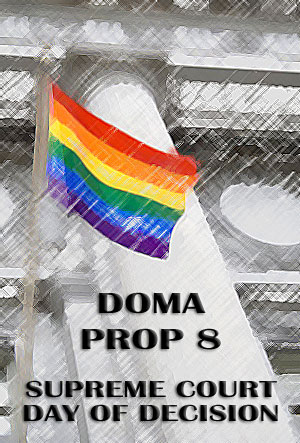Regardless of the outcome, we will need to be in the streets to secure our rights.
If we get option #1, a total loss, we need to be in the streets to challenge the legitimacy of an unelected, presumably 100% "straight" institution crapping all over the rights of LGBT people. In doing so, we will begin the long process of undermining that decision, much as we did with the odious 1986 Bowers vs. Hardwick decision, which ultimately led to the 2003 Lawrence vs. Texas victory.
The louder, the larger, the more vigorous our protests, the shorter will be our time in legal purgatory.
If we get option #2, a "total" victory over DOMA and Prop 8, we would be foolish and ignorant of history if we felt that our battles over these two anti-LGBT measures was over, let alone that we didn't have a lot more work to do on other fronts.
In 1954, Thurgood Marshall made a stunningly bold argument against the Supreme Court's previous "separate but equal" doctrine, and with the Brown vs. the Board of Education of Topeka, Kansas, victory, supposedly over-turned segregation in the nation's schools.
But even though the Court's 1954 decision said that segregation had to be removed "with all deliberate speed," no progress towards school desegregation was made for many years, until the Civil Rights Movement forced (partial) school desegregation in the mid-1960s and early 1970s.
Two additional cautionary tales about the 1954 victory that LGBT people should keep in mind:
Even if we get the most brilliant, sweeping victory from the Court that we could imagine, social inequality, with its attendant LGBTQ youth homelessness, suicide rates and other dysfunctions will still be with us in abundance. And de jure discrimination will be replaced with insidious de facto discrimination.
And what if we get Option #3, a mealy-mouthed "compromise"? This is the most likely option, and perhaps the greatest danger, as it will be a ploy to buy off LGBTs in the "Blue" states that have marriage equality, or are close to it, and leave LGBTs in the majority of the country twisting in the wind for perhaps a generation to come (if not longer).
While the heady feeling of "inevitable" marriage equality has spurred many erstwhile opponents to embrace our side (the Clintons, President Obama, any number of Republicans) and depressed the vigorousness of our most ardent opponents, it has also engendered a dangerous complacency on our side.
Will we someday, many years hence, look back at the year 2013 as being the high water mark of our movement? History has shown that powerful social movements can be side-tracked and defeated, sometimes for generations, by war, economic or environmental collapse, or other factors.
It is why we must press for the most full-reaching victory now, and not trust in any mythic "inevitability" when we most likely get a tepid statement out of the Court in late June. The higher we push the "high water mark" of our advance now, the more difficult it will be for our opponents later to claw things back to "the good old days" of blatant bigotry and discrimination.
Civil rights advance has never been inevitable, simply because it seems logical and right. Human history is replete with both examples of huge advances as well as devastating setbacks. We can no more count on inevitable advance than a player in the stock or housing markets can count on things inevitably going "up."
It is our duty to future generations of LGBTQ people to not rest on our laurels of steadily advancing poll numbers, legislative and court gains, but to press our advantage now for the greatest possible gains.
It is for that reason that the Gay Liberation Network along with other activists locally and around the country will be organizing "Decision Day" marches and protests for the evening of the day that the Supreme Court announces its decisions on the Defense of Marriage Act and Proposition 8.
In Chicago, we haven't yet settled upon a specific time of the evening and place that the Decision Day protest will take place, but will do so soon. In the meantime, join our Facebook Page so that you can keep up with the conversations about this and other activities.


